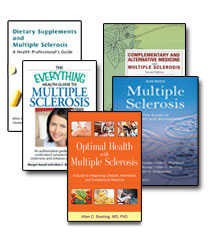Prokarin, or Procarin, is a preparation containing histamine and caffeine originally developed in Washington by Elaine DeLack, a nurse who has MS. This preparation is claimed to help with many MS-associated symptoms.
Dr. Bayard Horton and Dr. Hinton Jonez developed a theory about histamine in the 1940s and 1950s, which was the basis for development of Prokarin. The histamine in Prokarin is thought to enlarge blood vessels and decrease allergic reactions, while caffeine acts as a stimulant.
Treatment Approach
Prokarin is delivered using a patch applied to the thigh. This method is used because the histamine is not absorbed if taken orally. One study of Prokarin in MS applied two patches a day, each for 8 hours.
Evaluation in MS and Other Conditions
There is only limited information available about the effectiveness of Prokarin. Its developer, Elaine DeLack, claims that Prokarin dramatically improved her condition. One small MS study in Washington found that 80% experienced some improvement in symptoms with Prokarin. They reported improvements in speech, incoordination, weakness, walking unsteadiness, fatigue, and bladder and bowel issues.
Another study of Prokarin involving 55 people with MS found that 67% reported some improvement in symptoms including numbness, pain, weakness, depression, fatigue, and walking difficulties. This study lacked a placebo and a caffeine control group, making the results difficult to interpret. Furthermore, it relied heavily on self-assessment and not on objective measurement.
One study that did include a placebo-treated control group was published in 2002. This study found that Prokarin helped with fatigue. By looking at the blood caffeine levels of the treatment and control group, it was determined that caffeine was not the reason for the decreased fatigue. They also reported that their subjects had no changes in thinking abilities, arm coordination, or walking.
In the 1940s and 50s, reports were published concerning histamine treatment for MS. These studies did report positive findings, but they lacked adherence to the strict clinical trial guidelines. Furthermore, due to the fact that histamine was used in conjunction with other treatments, it is impossible to determine exactly what effects were due to the histamine.
In 1999, the Clinical Advisory Committee of the Greater Washington Chapter of the National Multiple Sclerosis Society released a statement about Prokarin. This statement from area physicians and nurses expressed concern that Prokarin was being used instead of conventional medical treatment. It went further to say that Prokarin did not appear to be a beneficial treatment for MS and that the conventional medications are known to be effective.
Adverse Effects
There is limited information available concerning the safety of Prokarin. Histamine carries the risk of increasing the severity of asthma symptoms, and it has been reported that Prokarin has triggered severe asthmatic attacks. People with asthma should not use Prokarin. A case report exists of an individual experiencing loss of appetite and irritability while taking both lioresal (Baclofen) and Prokarin. People have reported skin irritation and rashes where the patch is applied. Prokarin is not a replacement for conventional MS medications, especially those that modify the course of the disease.
Summary
Prokarin treatment is expensive and limited data are available regarding its safety and its efficacy. One small study reported that Prokarin may help with fatigue. People with asthma should not use Prokarin because of potential risks associated with histamine. Prokarin should not be used instead of conventional medications.
References and Additional Reading
Books
Bowling AC. Complementary and Alternative Medicine and Multiple Sclerosis. New York: Demos Medical Publishing, 2007, pp. 195-197.
Journal Articles
Alonso A, Jick SS, Hernan MA. Allergy, histamine 1 receptor blockers, and the risk of multiple sclerosis. Neurol 2006;66:572–575.
Gillson G, Richards TL, Wright JV, Smith RB, Wright, JV. A double-blind pilot study of the effect of Prokarin on fatigue in multiple sclerosis. Mult Scler 2002;8:30–35.
Gillson G, Wright JV, Ballasiotes G. Transdermal histamine in multiple sclerosis. Part 1: Clinical experience. Alt Med Rev 1999;4:424–428.
Horton BT, Wagener HP, Aita JA, et al. Treatment of multiple sclerosis by the intravenous administration of histamine. JAMA 1944;124:800–801.
Jonez HD. Management of multiple sclerosis. Postgrad Med 1952;2:415–422.






